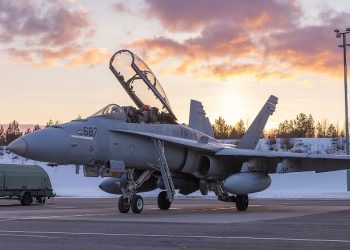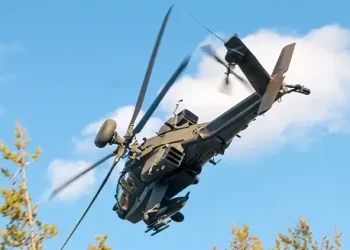Defence Secretary John Healey announced a record £4.5 billion UK military aid package for Ukraine in 2025, emphasizing the UK’s commitment to supporting Ukraine amidst Russia’s stalled invasion and economic strain.
This move highlights the UK’s strategic role within NATO and its potential impact on British defense contractors.
UK’s Record Military Aid Commitment
The UK has pledged an unprecedented £4.5 billion in military aid to Ukraine for 2025, marking its largest annual commitment to date.
This substantial support underscores the UK’s dedication to assisting Ukraine in its ongoing conflict with Russia, which has seen significant Russian casualties and economic challenges.
Immediate Support for Ukrainian Forces
- £360 million allocated for immediate battlefield supplies
- £200 million dedicated to drones, radars, and anti-tank mines
- Supplies expected to reach Ukrainian forces within a month
- Operation Interflex continues training Ukrainian troops
- 45,000 Ukrainian soldiers trained since 2022 under UK-led initiatives
The Economic Strain on Russia
The conflict has placed immense pressure on Russia’s economy, with military spending consuming 40% of its budget.
Inflation rates have soared to 10%, while interest rates have reached a staggering 21%. These economic challenges are compounded by the high casualty toll among Russian forces.
The Human Cost of Conflict
- Over 940,000 Russian casualties reported since the invasion began
- An average of 1,300 daily casualties recorded in March 2025 alone
- NATO coordination through the Ukraine Defence Contact Group remains crucial
- Sustained resistance from Ukrainian forces could lead to negotiations with Russia
- No direct UK conscription; however, increased defense spending may affect domestic services funding
NATO Coordination and Strategic Focus
The UK’s leadership role within NATO is evident through its co-chairing of the Ukraine Defence Contact Group alongside Germany.
This collaboration emphasizes international efforts to counter Russian aggression and highlights the importance of transatlantic partnerships in maintaining global security.
Full Healey Statement (as delivered) to the House of Commons
“Thank you Mr Speaker. Today, HMS Prince of Wales set sail from Portsmouth and I trust the whole House will join me in wishing the entire carrier strike group a safe and successful global deployment.
Mr Speaker, I wish to make a statement on the ongoing war in Ukraine.
Today, parliament returns from its Easter break.
But during the last two weeks Putin’s illegal invasion of Ukraine has continued. Drones strikes. Missile attacks. Fierce fighting on the frontline.
On Palm Sunday, men, women and children in Sumy, on their way to church were hit by Putin’s deadliest attack on Ukrainian civilians so far this year, killing 35 people – including young children – and injuring over 100 more.
We are united in condemnation at this brutal attack and Putin’s illegal actions.
At this critical moment for Ukraine and for European security, we have stepped up the Government’s efforts for Ukraine and we will step up further, both to increase military support for the fight today and to secure peace for tomorrow.
Mr Speaker, we cannot jeopardise the peace by forgetting about the war.
So, ten days ago in Brussels, the UK convened and I co-chaired the 27th meeting of the Ukraine Defence Contact Group, alongside my good friend, the German Defence Minister Boris Pistorius.
51 nations and partners – from Europe from the Indo Pacific, from South America – came together at NATO HQ, including Ukrainian President Zelensky, US Defence Secretary Hegseth and NATO Secretary General Mark Rutte.
We came together to step up our support for Ukraine in the fight. Together we pledged a record 21 billion euros of military support to put Ukraine in strongest possible position and to increase pressure on Putin to negotiate.
Mr Speaker this year, the UK is providing £4.5 billion in military support to Ukraine, more than ever before.
And in Brussels, I announced £200 million of support will be surged to the front line, with supplies starting to reach Ukraine’s fighters within the next month including radar systems, anti-tank mines and hundreds of thousands of drones.
I also announced £160 million worth to help the repair and maintenance essential battlefield vehicles and equipment.
This support will strengthen Ukrainian troops in the close fight now and strengthen our industrial links with Ukraine to boost UK businesses.
When President Trump talks about peace through strength, it’s the commitments made through this Contact Group that provide the strength to secure that peace.
Despite President Putin’s promise of a 30-hour pause in fighting, I can confirm that Defence Intelligence have found, and I quote “no indication that a ceasefire on the frontline was observed over the Easter period”.
And 10,000 missiles and drones have been fired into Ukraine during this year alone, including from the Black Sea.
So, while Putin has said he declared an Easter truce – he broke it.
While Putin says he wants peace – he rejected a full ceasefire.
And while Putin says he wants to put an end to the fighting – he continues to play for time in negotiations.
And the military, the Russian military continue to press on a number of fronts.
Mr Speaker, I can confirm Russian military progress is slowing.
Putin gained less territory in March then he did in February and less territory in February than he did in January.
Ukrainian towns which Russia have been targeting since before Christmas have still not been captured.
Ukrainian troops have still not been ejected from Russian territory in Kursk.
Whatever ground Putin is taking comes at enormous human cost. Over 940,00 Russians have likely been killed or injured in the war so far – including over 150,000 killed and injured this year alone.
Last month, the average daily casualty rate on the Russian side was 1,300 – almost double the rate of this time last year.
While at home, Putin faces crippling interest rates at 21 per cent, inflation running at over 10 per cent and the Russian government is spending nearly 40 per cent of its total budget on this military campaign.
I have to say Mr Speaker, in the days ahead, it is likely that Russia will keep up attacks on the Sumy oblast to help it fully reclaim nearby contested areas of Kursk.
In central Donetsk oblast, Russia is targeting urban strongholds such as Toretsk, Povrosk and Chasiv Yar.
And in Kharkiv, Russia is continuing to make assaults towards the rail and logistics hub of Kupiansk.
We do expect more ground to be taken, and more Russian missiles fired into Ukraine.
And that is why we must remain united for Ukraine across this House, across this country, and across those nations standing alongside Ukraine.
And we will step up support for Ukraine and pressure on Putin to force him to recognise that now is the time for peace, and continuing the war will prove much worse in the long run for Russia.”
Additional Reading
Parting Shot
The UK’s substantial military aid package for Ukraine reflects its strategic commitment within NATO and highlights potential impacts on British defense contractors.
While this support strengthens international alliances against Russian aggression, it also raises questions about domestic funding priorities amid rising defense expenditures.
Discover more of Todays Top Breaking News Stories!
Sources: UK Government, NATO, BBC News, Ministry of Defence and The Rt Hon John Healey MP.
Prepared by Ivan Alexander Golden, Founder of THX News™, an independent news organization delivering timely insights from global official sources. Combines AI-analyzed research with human-edited accuracy and context.








